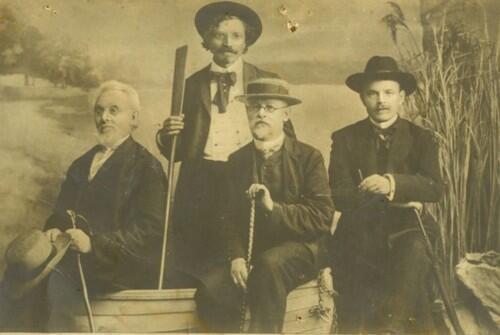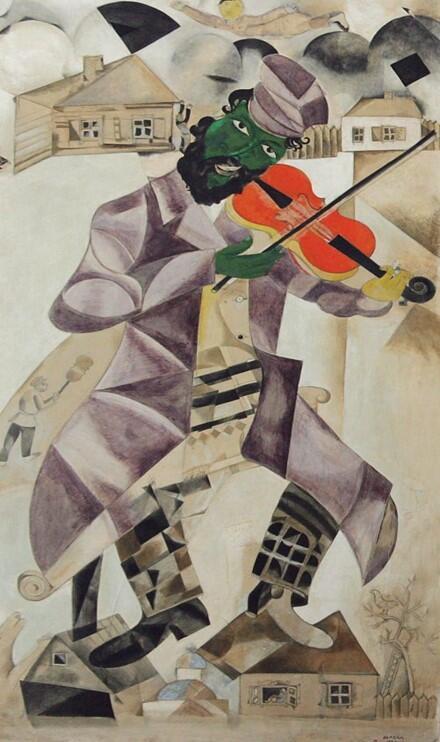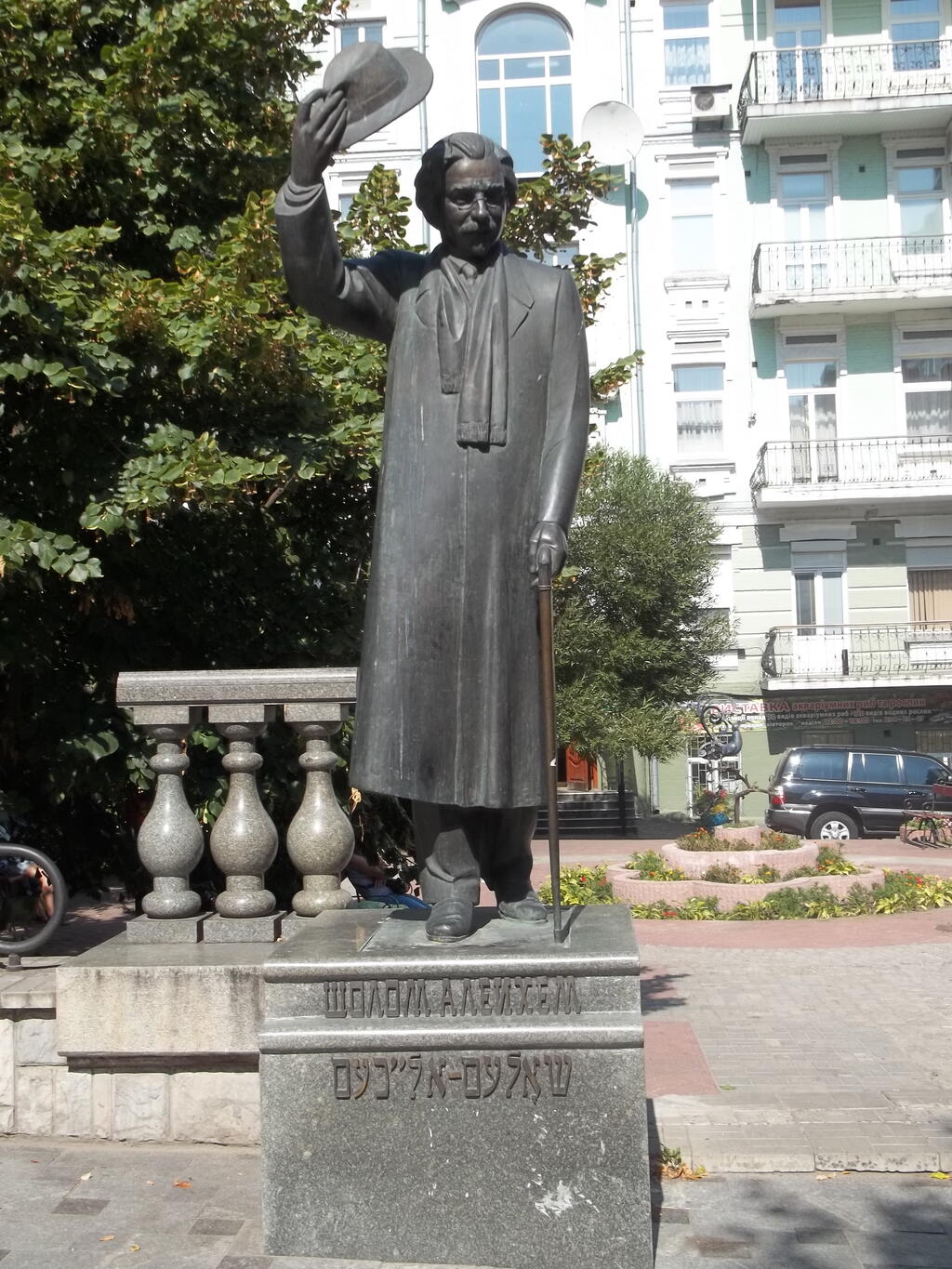Getting your Trinity Audio player ready...
Sholem Aleichem once wrote: "Life is a dream for the wise, a play for the foolish, a comedy for the rich, a tragedy for the poor".
His book "Fiddler on the Roof" is a reference to the Judaism of eastern and central Europe, to the "Shtetl", i.e. the town or village that had been granted and demarcated for the Jewish population in those areas. At that time, the union of the vast territories of Russia, Ukraine, Poland, Lithuania, Belarus, and Moldova was known as the "Pale of Settlement" (or Chertá Osédlosti in Yiddish).
The Pale of Settlement was created by Empress Regnant of Russia Catherine the Great herself in 1791, in order to enclose in some way the Jews who were beginning to form a bourgeoisie, although in some cases they were also involved in agriculture.
One of those places where the world of Shtetl and Yiddish flourished was in Ukraine, far removed from German enlightened Judaism and perfectly alien to the world of Ladino and Sepharad. There, a play about the daily life of a small Jewish merchant, part of the nascent local bourgeoisie, known as Tevie 'the milkman', was immortalized.
Sholem Yakov Nokhuomovich Rabinovich, who took up the pen name of Sholem Aleichem, was born in an old town in the Ukrainian city of Pereiaslav, which had its name altered by the Soviets in 1943. It was renamed Pereiaslav-Khmelnytskyi after Bohdan Khmelnytskyi, a Cossack ally of Alexander I was Emperor of Russia, the first "Hetman" (ruler in Poland, Ukraine, and the Grand Duchy of Lithuania) of the Cossack Hetmanate (Ukrainian-Cossack state).
However, in 2019, the Ukrainian parliament reinstated the city's original name, to disassociate it from its Russian past, although that is still in dispute.
The city, which is known as a "living museum" because of its rich history, was once home to a sizeble Jewish community, dating back to at least the 17th century, with a written record from 1620, in which the city's residents complained to King Sigismund about the Jews' commercial success.
It is striking that the only evidence proving the existence of the Jewish community in Pereiaslav mentions an antisemitic event. But, just as there was a considerable Jewish population throughout this area of central and eastern Europe, there was always a latent antisemitism among the very people the Jews inhabited.
Under the pseudonym or nom de plume of Sholem Aleichem, Hebrew for "peace be with you", Rabinovich was by no means oblivious to this reality, despite having been born into a bourgeois (though later impoverished) family, and then later having married his ward Olga (Hodel) Loev, daughter of one of the few Jewish landowners.
Aleichem wrote his first novel at the age of 15, a Jewish adaptation of Daniel Defoe's most famous novel, Robinson Crusoe. Although he had idealized writing in Russian or Hebrew, he later turned to Yiddish after analyzing its better accessibility to the Jewish masses, and of course realizing that his world was the Shtetl.
Aleichem's stint in the world of journalism is no less irrelevant than his work. In 1879 he became a local correspondent in Kyiv for the renowned Hebrew newspaper "Ha-Tsefirah" ("The Epoch" in Hebrew), i.e. the first newspaper published in Hebrew in Poland. It as founded in Warsaw by Ḥayim Zelig Słonimski and published between 1862 and 1931. The main purpose of the weekly was to report news about Jews in the area and to provide general information, including articles on natural sciences and the latest inventions.
From 1880 to 1883 he served as a crown rabbis in Lubny, a position in the Russian Empire that consisted of being an intermediary between his community and the imperial government. The crown rabbis was responsible for civil duties such as the registration of births, marriages and divorces. The main requirement for this position was to be able to communicate in Russian without any problems.
Also, the crown rabbis were considered agents of the state, not real rabbis, and were generally not educated and had no knowledge of Jewish law.
4 View gallery


The greatest Jewish and Hebrew literature writers in Odesa, Ukraine, from right to left: Hayim Nahman Bialik, Mordechai Ben Ami, Sholem Aleichem and Mendele Mocher Sforim
(Photo: The collection of Yodaika postcards from Joseph and Margit Hoffman, the National Library)
Although he was a Yiddish writer and not really connected with the Haskalah or "Jewish enlightenment," he was not far removed from it either. In 1881 and 1882, his articles, focusing on Jewish education, appeared in Ha-Melits, the main medium for disseminating Haskalah. Rabinovich was, of course, a "maskil", i.e. a Hebrew and Yiddish scholar.
Rabinovich's official work was released in 1883, when he was 24 years old, with Tsvey Shteyner ("Two Stones"), his first Yiddish story, where he used his pen name for the first time. In this work, he fictionalized a romance with his future wife.
The story ended with the suicide of the two young protagonists. Indeed, his works are characterized by a personal, intimate and reserved style, as well as by his preoccupation with everyday affairs, and a strong connection with Ukraine.
In Ukraine, Aleichem lived in different cities, such as Kyiv, Lviv and Odesa - home to a large Jewish community until the Holocaust. He also traveled and lived in small Jewish villages before moving with his family to the United States of America in 1905, having been ruined by his bad economic decisions of speculation on the Kyiv stock exchange.
It was about this episode in his life that he wrote "Der spekulyant" ("The Speculator"), depicting his own tragic experiences. In New York, he was very well received by the press and by Jewish and American society. Earlier, he tried his hand at theatre. He premiered his drama Tsezeyt un tseshpreyt (scattered and dispersed) in Warsaw, which was successfully performed on the Polish stage, but could not be produced in Ukraine, due to misgivings on the part of the Russian authorities.
It did not go well in the U.S., however, so much so that he had to return to Europe. Although in the end, he went back to New York once again. It was there that he was dubbed the "Jewish Mark Twain".
In 1888, Aleichem had founded a literary almanac modeled on the most important European literary magazines, but in Yiddish, under the name 'Di yidishe folks-bibliotek' (The Library of the Jewish People). This became a milestone in the history of modern Yiddish literature and helped Aleichem gain recognition throughout Europe and even in the U.S.. However, after the publication of the second volume in 1889, he went bankrupt and halted the project.
Aleichem never stopped writing, and thanks to him, Yiddish gained cultural, artistic, literary and academic status, as well as crossing national and artistic borders, reaching its apex after his death with "Fiddler on the Roof".
In this story of Tevie "the milkman", there is an imaginary place that Aleichem creates for his works and that is Kasrilevka, which will timelessly represent the figure of the archetypal Shtetl. The prototype of Kasrilevka was the Ukrainian village of Voronkov, where Aleichem grew up.
"If I were Rothschild" ("Ven ikh bin Roytshild") - a monologue written by Aleichem in 1902 with reference to the iconic family as the epitome of European Jewish wealth. This would posthumously inspire the centerpiece of "Fiddler on the Roof," his most important literary work, which is also a metaphor for the people of Israel in exile in the face of the many challenges that fate has thrown at them.
His Yiddish Jewish colleagues and friends supported him and his family with donations, among them IL Peretz, Jacob Dinezon, Mordecai Spector and Noach Pryłucki, until his death on 15 May 1916.
His funeral was the largest ever seen in New York City, more than 150,000 mourners accompanied the writer's coffin from his home in the Bronx to the Ohab Tzedek synagogue in Harlem, down Fifth Avenue to the Lower East Side, and finally to Mt. Nebo Cemetery in Cyprus Hills, Queens.
The New York Times reported not only on the nature of the funeral, but also on Aleichem's request not to be buried "among the aristocrats and the powerful," but "among the people". Moreover, he wanted to be buried in Kyiv next to his father's gravestone. And, despite the significance of his death - the man, the writer, the symbol - died virtually alone, isolated, poor, and ill.
Aleichem is more than a classic, he is a symbol of the Jewish people and their survival. His memory lives on. In Ukraine, there are several streets in different cities named after him, plus a symbolic statue. In Israel, in the city of Netanya, there is a statue and a number of streets named after him. In Moscow, there is another statue and in New York, a street is named after him. On Broadway, he is remembered as one of the most important playwrights in history.
He is, therefor, a universal figure who should also remind the world today that peace is possible. He was Jewish, also Ukrainian. He lived through antisemitism, specifically the pogroms, which prompted him to emigrate. His legacy is invaluable for European Judaism, Israel, and world culture.
David A. Rosenthal is a political scientist, journalist, and international analyst




